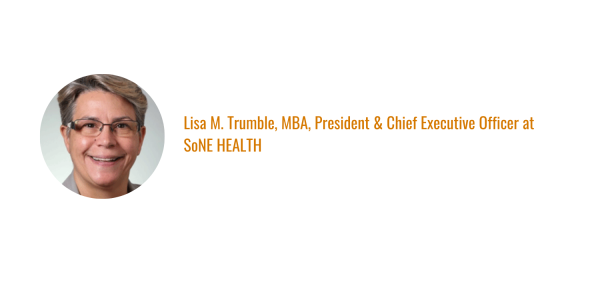By: Lisa Trumble, MBA
President & Chief Executive Officer
The Connecticut General Assembly adjourned the first week of May after tackling several key issues important to healthcare consumers. This was the first year that SoNE HEALTH was active in several discussions related to the outcome of these proposals in collaboration with our government relations team. As our region’s leader in population health management and value-based care, we focused our involvement on discussions related to these topics.
Based on our limited involvement in the 2024 legislative session, we anticipate ongoing discussions in the future about ways to put medical care back in the hands of physicians.
Specifically, three pieces of legislation were proposed to restructure Connecticut’s healthcare delivery system. While each of them fell short of passage, we do expect these subjects to be up for discussion during a busy election season, and possibly to return as legislative proposals in 2025. What follows is information on these three bills, each of which could have had a deep impact on SoNE HEALTH’s day-to-day operations.
Senate Bill 9 (SB 9) – “An Act Promoting Hospital Financial Stability”
This contentious bill was introduced as a top priority for Governor Lamont and the Office of Healthcare Strategy (OHS) to make sweeping reforms to transfers of ownership involving hospital systems, large group healthcare practices, and healthcare facilities. The bill, as originally proposed, would have required all hospitals, large group practices, and healthcare facilities to be subject to the enhanced transfer of ownership review after January 1, 2026. In addition, it would have expanded OHS’ ability to consider a cost and market impact review when issuing certificate of need determinations.
SB 9 did not receive a vote in either the Senate or House before the end of session, but is likely to be the subject of a larger conversation in the off-session months related to health care policy. SoNE HEALTH participated in demonstrating the negative impact some of the changes would have had on movement towards value-based care for Connecticut patients.
House Bill 5377 (HB 5377) – “An Act Concerning the Connecticut Health Insurance Exchange”
State regulators proposed a provision early in the legislative session that would have offered additional disclosure requirements regarding the sharing of health data in Connecticut.
As originally drafted, HB 5377 required the Connecticut Health Insurance Exchange to hold public meetings and receive legislative approval prior to either (1) Entering into nondisclosure or settlement agreements or charging assessments or user fees or (2) Changing the amount of, or process used to calculate, assessments or user fees.
The legislation was largely championed by the health carrier associations in the state, but was opposed by the Office of Healthcare Advocate during its hearing. It did not receive a final vote before the committee’s deadline to act on it.
House Bill 5411 (HB 5411) – “An Act Concerning Requests for Health Records and the Fees Charged for Access to Such Records”
HB 5411, considered by the Judiciary Committee and the House of Representatives, would have imposed new changes to fees charged by providers to those seeking voluminous amounts of medical records. The most sweeping and potentially devastating provision of the bill would have prohibited providers from charging any fees for records related to workers’ compensation claims.
While the House made some changes and adopted the proposal, the Senate did not call this legislation for debate before time lapsed, despite a push for passage by the Connecticut Trial Lawyers Association.
SoNE HEALTH looks to continue to take an active role in advocating for improvements towards a healthcare system based in value, where the quality increases while the overall cost of care is responsibly managed. The result will benefit us all.
